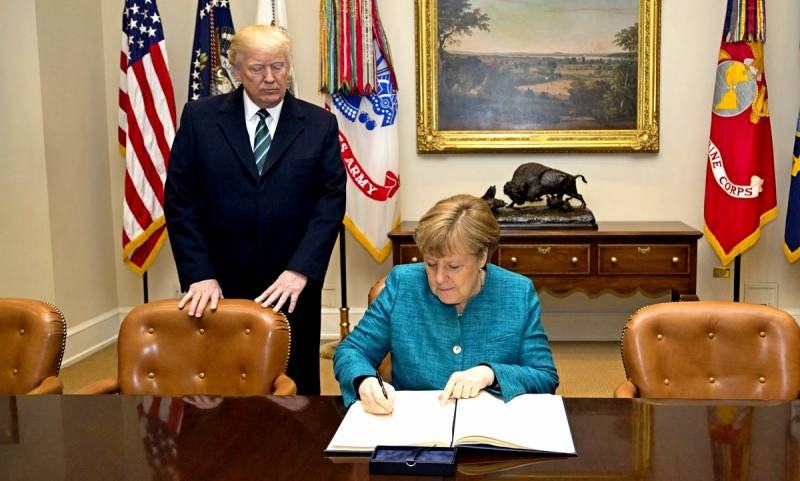Why Germany openly sabotages Washington's policy
In recent years, it has become noticeable how the US began to stagger as a world hegemon. Gradually, new centers of power are being formed, the military and economic the power of China, standing unrepeated by decades of Western sanctions, Iran, the Russian elites are gradually getting rid of pro-Western illusions. International organizations, alternative to the closed western club G7, are being created - G20, BRICS and SCO.
Together, these changes, like water, are gradually sharpening the stone foundation of a unipolar world, built under the direction of Washington. President Donald Trump has come to the White House for at least four years, representing the part of American elites who are opposed to the ideas of globalism. Interesting trends are also observed in the camp of the Western coalition. Some experts tend to call Germany the fifth column, which undermines policies USA directed against Russia and Iran. What is the reason for this position of Berlin?
Many European companies, primarily German ones, rushed to the Islamic Republic in 2015 after the conclusion of the so-called "nuclear deal" with Tehran. At present, it is Germany that is Iran's largest trading partner; in the past 2017, its exports amounted to 3,6 billion euros. German manufacturers supply Tehran with industrial equipment, chemicals, automobiles, medical and pharmaceutical products. In exchange, she receives from the Islamic Republic agricultural products, carpets and raw materials for a modest 300 million euros per year. According to some intelligence, Tehran is looking for opportunities to get military and nuclear in Germany Technology.
Angela Merkel promised to protect European companies working with the Islamic Republic with the help of the so-called “blocking law” of 1996, which would annul the consequences of violations of US sanctions. And all this despite the fact that Iran violates the rights of sexual minorities, and Tehran supports the regime of Bashar al-Assad and builds military infrastructure for the war against the American ally in the Middle East represented by Israel.
No less annoying in the West is the actual Berlin support for Russia. At the official level, Germany condemned the Kremlin for the “annexation of Crimea,” actions in the Donbas, for supporting Bashar al-Assad, and joined the anti-Russian sanctions. But on the fundamental issue of Germany’s energy security and the effectiveness of her business, the German Chancellor supported the Nord Stream-2 gas pipeline project, despite all the pressure exerted by Washington and a number of Eastern European countries.
Some people wonder why Berlin will not intercede for Moscow the way it did for Tehran. Perhaps the fact is that Russia, as a bear in the taiga, simply does not need its intercession.
Together, these changes, like water, are gradually sharpening the stone foundation of a unipolar world, built under the direction of Washington. President Donald Trump has come to the White House for at least four years, representing the part of American elites who are opposed to the ideas of globalism. Interesting trends are also observed in the camp of the Western coalition. Some experts tend to call Germany the fifth column, which undermines policies USA directed against Russia and Iran. What is the reason for this position of Berlin?
Many European companies, primarily German ones, rushed to the Islamic Republic in 2015 after the conclusion of the so-called "nuclear deal" with Tehran. At present, it is Germany that is Iran's largest trading partner; in the past 2017, its exports amounted to 3,6 billion euros. German manufacturers supply Tehran with industrial equipment, chemicals, automobiles, medical and pharmaceutical products. In exchange, she receives from the Islamic Republic agricultural products, carpets and raw materials for a modest 300 million euros per year. According to some intelligence, Tehran is looking for opportunities to get military and nuclear in Germany Technology.
Angela Merkel promised to protect European companies working with the Islamic Republic with the help of the so-called “blocking law” of 1996, which would annul the consequences of violations of US sanctions. And all this despite the fact that Iran violates the rights of sexual minorities, and Tehran supports the regime of Bashar al-Assad and builds military infrastructure for the war against the American ally in the Middle East represented by Israel.
No less annoying in the West is the actual Berlin support for Russia. At the official level, Germany condemned the Kremlin for the “annexation of Crimea,” actions in the Donbas, for supporting Bashar al-Assad, and joined the anti-Russian sanctions. But on the fundamental issue of Germany’s energy security and the effectiveness of her business, the German Chancellor supported the Nord Stream-2 gas pipeline project, despite all the pressure exerted by Washington and a number of Eastern European countries.
Some people wonder why Berlin will not intercede for Moscow the way it did for Tehran. Perhaps the fact is that Russia, as a bear in the taiga, simply does not need its intercession.

Information